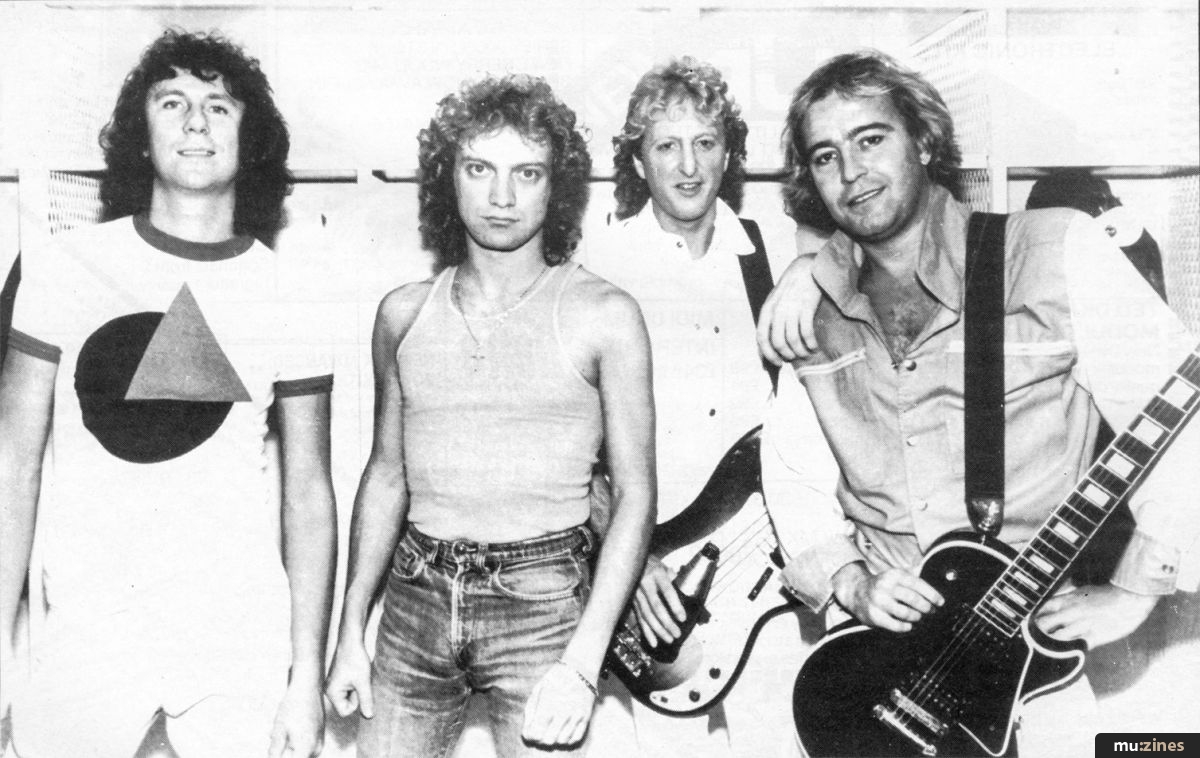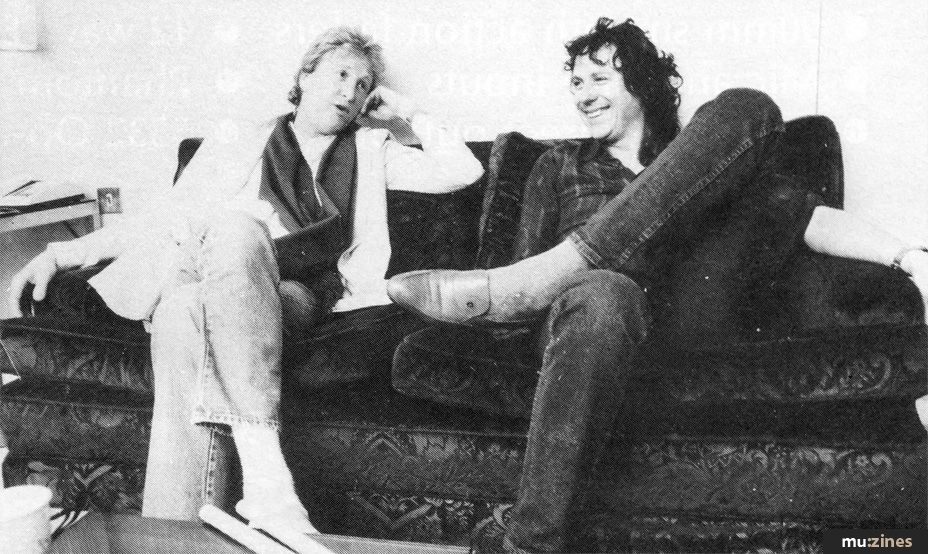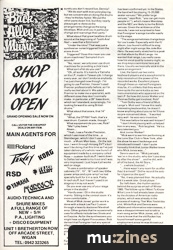Magazine Archive
Home -> Magazines -> Issues -> Articles in this issue -> View
Foreign Affairs | |
ForeignerArticle from International Musician & Recording World, April 1985 | |
US successes return to Blighty with the formula for Stateside MOR safely intact. Interview by Jonathan James
The Foreigner rhythm section wax lyrical about production, equipment and recreating their massive sound live

Dennis wasn't sure whether jet-lag or alcohol were to blame, but he'd woken up that morning on the bathroom floor of his suite in the Inn On The Park, still fully dressed. What was worse was that he'd frightened the chambermaid, who hadn't noticed him down there, prostrate on the shag-pile.
Noticing my raised eyebrow, Foreigner's bassist Rick Wills tried to allay my suspicions.
"Don't worry — Dennis often passes out."
Mind you, he had good cause — Foreigner, the group for which Dennis Elliot plays drums, had just achieved their first ever number one single with I Want To Know What Love Is, their new LP Agent Provocateur was at number five, and it was predicted to top the charts next week (it did, enabling Foreigner to achieve the rare double first). Across the world, sales are equally vast, with the single at number three in Australia, number two in the USA...
"It happened so quick — we were really surprised," Rick grinned, and it's our first number one. It's really nice to come home in this situation."
For a group with such an American sound as Foreigner to talk about "coming home" may sound surprising, but the band are, with the exception of vocalist Lou Gramm, all British. Which makes their name an ironic comment in itself.
"We are an American band — America is home for us now — so touring anywhere, even Britain, is abroad. We all live around New York, which is where our management offices are."
Following the enormous success of Foreigner IV... "— though that wasn't our biggest selling record," interjected Dennis. "We've just found out that Double Vision is still the most popular LP."
... why has it taken you so long to record a follow-up since IVcame out in 1981. Rick?
"Er... touring... in all, since its conception, this album's taken over a year to do. We started working on the songs... then we began pre-production work with Trevor Horn."
"I remember we broke for Christmas — not this one, but the before," Dennis laughed.
"We were in the studio physically putting down the tracks with Trevor, and he wanted us to come over here to work in his studio Sarm West; and it just didn't work out."
What was it like working with the Nietzsche of British Pop?
"Nice...", Rick was obviously being cagey here, "but for a certain type of music, for electronic music; for that it's fine. But it's not right for us. We kept one or two of the basic tracks for use on the LP. But he realised we were thinking in different directions, and it wasn't going to work out. He tried to make us more electronic than we wanted to be."
"He didn't know what drums should sound like, and I was discouraged by that. I'd say 'how does it sound, Trevor?' and he'd reply 'I don't know, come and listen, you tell me...' It was using natural drums. When the drum sound was good, he asked 'can I sample it?' No way!"
"Trevor Horn... didn't know what drums should sound like."
Admittedly Foreigner and Trevor Horn make an unlikely combination. It seems that the arrangement came about through guitarist and leading light, Mick Jones.
According to Rick, "it was to be a challenge. We met him, got together, and Mick was really intrigued by the whole situation. But it just didn't work."
"We came over to England to record the rest of the album with Trevor," Dennis continued, "and he bowed out and left us the whole thing. That set us back, as we were planning on an early Summer release. We then had to get together with different producers..."
Which is why the record has been so long coming?
"We weren't doing it on purpose, I can assure you," apologised Rick.
Agent Provocateur ended up being co-produced by Alex Sadkin and Mick Jones. Sadkin is perhaps best known for his work with Grace Jones, so it must have been something of a departure for him to work with such a no-nonsense traditionalist Rock band as Foreigner. But as you can hear in the crisp and clean production of the record, his talents were evidently well-suited to the job. Rick outlined Alex's role in the making of the LP:
"Mick is the driving force, make no mistake. He sits there and oversees everything. Alex keeps him on line, concentrating on doing the record, and stopping him going off on tangents all the time, sampling hoovers and daft things life that. Alex is a very even keel, very together guy to work with; calm, reassuring — he kept everything rolling along nicely. Nice person to work with."

They got music, they got rhythm
Mutt Lange is the other producer whose name has been linked with Foreigner in recent years — his was the guiding hand behind Foreigner IV.
"Mutt was very different from Alex... pretty heavy going; Mutt was much more the musician — frustrated musician — who wanted to play and rewrite everything if he'd been allowed to. And he is a very strong writer in his own sense. Like with Def Leppard, he does tremendous work..."
Given Mick Jones' central importance in Foreigner, I was interested in the processes that led up to the band's performances, either in the studio or on stage. Was it a matter of Mick turning up with finished songs for the rhythm section to back up?
"Well, when we know we've got an album to do, we just get together, the four of us. In our management offices, we've got a small studio room, which has been sound-proofed. We get in there with a tape-machine (we're using a Fostex eight-track at the moment), and Mick comes in with cassettes every day; it's either new stuff he's done overnight, or old songs he's had hanging around for a while. We listen and say 'stop the tape' if we hear something we like. Then we work round the idea, try and shape it into something."
Dennis took up the story: "We get as close as we can, until we think we're about ready to record it. Normally a song goes through many changes in the studio, so we don't bother smoothing out the rough edges at this stage."
"Every day we'll work on something, and we'll end up banging it down on the Fostex. We try a few vocal parts and overdubs just to see what might work. Then that'll be kept on one side. Next day, we'll come in and work on something else. We did that for about two months before this LP."
Do you ever use the demos in the studio, by transferring them to the multitrack?
"Alex Sadkin is a very even keel, very together guy to work with."
"No, the quality's just not good enough. Though we have been given these new boards, the Akai 12 channel things, and they're brilliant. That could possibly work next time, as the quality's really good. And they're easy to use."
The credits on the new LP mention two studios in New York; Hit Factory and Right Track. Why did Foreigner find it necessary to use two separate locations for recording?
"Well," Rick explained, "at Hit Factory, we liked the room we were working in — "
" — and the equipment is very important to Mick; Hit Factory has a Neve board..." continued Mr Elliott, "... it's tough to get everything you want in one studio."
"It's a combination of room and equipment, really. That worked for a certain time; then it got very claustrophobic in the control room at Hit Factory, so about halfway through we felt like a change might be good. Right Track's got a much more spacious, airy control room with a Solid State Logic board... we ended up doing most of the overdubs and vocals there."
How do you work in the studio? The new album has a very live sound to it... surely you don't record live, Dennis?
"We do start with everyone playing, but we concentrate on doing the drums — they're the key factor. We put the other parts down live, but they nearly always get re-done as the arrangements change as the song develops. Mick and Lou in particular change and rearrange their parts."
What about that great beatbox drum sound at the beginning of Tooth And Nail — was that a Simmons?
"Under the intro? That was just a synthesizer noise triggered from the snare drum."
Triggered? Does this mean you use drum machines? Sampled drum sounds?
"No, never; we only ever use drum machines for providing a click track."
What sort of kit do you use?
"Oh, all sorts. It's mainly a Yamaha on the LP, made in Taiwan job. I change every year, as I don't endorse anybody. I've just changed now though — I'm going to use Premier. I haven't used Premier professionally before, so I'm really excited about it. We asked Premier to make me a special kit, with different sizes they don't normally make — in particular, a 26" bass drum, which isn't standard, surprisingly. I'm looking forward to using British drums."
What about that snare, that 14" thing?
"What, the CP700? Yeah, that's a neat drum. Custom-made, though."
"Mutt Lange... was much more the frustrated musician..."
What equipment do you use, Rick?
"Me? I play bass."
Ahem...
"Yeah, I use a Fender Precision, which I use most of the time... a Steinberger, which I don't use very much... a Music Man bass... On the last tour, I went through Ampeg SVT's but I won't be doing that this time as I've just taken delivery of a whole new bunch of equipment made by a company called Ross — custom-built stuff. I went down to Dallas last week to try it out and I was very impressed. I just hope it all works well on stage.
"It uses a combination of speaker cabinets (15", 10", 18") with two 500w power amps and a pre-amp I've had specially built for it in a rack. Pretty hi-tech stuff, but I haven't used it on stage so it may not work."
Do you ever use any of your stage amps in the studio?
"Hardly ever. I DI in the studio mainly. Sitting in the control room. It's more comfortable..."
Most of Mick Jones' guitar work is done with a black Les Paul Custom through a heavily doctored Marshall amp. Other guitars that he occasionally uses for effects include two Strats and an Esquire. As for the synthesizers you might hear on Agent Provocateur, Rick denied that Foreigner had any special allegiances, preferring to use what was available. This includes Yamaha pianos, a Synclavier, and much Jupiter 8.
March 10th marks the beginning of Foreigner's US tour. Dates are planned in Europe for the Summer, but nothing has been confirmed yet. In the States, the band will be playing 15-20,000 seater venues ("We prefer large venues," says Rick; "you can get more people in!"), which means Wembley and the NEC are likely to be the British venues. Given the ambience of the records, I was not surprised to hear that Foreigner's songs transfer easily to the stage.
"The songs sometimes change keys for Lou's sake. Especially with the IV album, Lou found it difficult to sing night after night songs like Juke Box Hero. He was really stretched to a peak on that album by Mutt Lange — he wanted that range. Lou really cares how his vocal quality is every night, so we drop keys a semitone here and there. Usually we basically stick to the same arrangement."
Live, the band use two extra keyboard players and a saxophonist to help reconstruct the power of the recorded works. Excellent players though these un-named Foreigners may be, it's unlikely that they would have quite the same kudos as two instrumentalists who appeared on the last LP. So how did Junior Walker and Thomas Dolby get involved, Rick?
"Tom Dolby was a friend of Mutt Lange's. Mutt said 'I know this really interesting keyboardist, he doesn't know anything about you so he'll have no pre-conceived ideas...' It worked very well — he was very inventive."
This was before he was well-known?
"I don't think playing with us helped him in anyway," Rick laughed. "He's a very talented guy."
And Junior Walker?
"Mick went to see him performing at the Lone Star Club in New York; after the show he went backstage and introduced himself — I don't quite honestly think that Junior Walker knew who Mick Jones was..."
Dennis went on. "Mick just said, 'we're in the studio, why don't you stop by after the show?'... and he did, with all of his band, the All Stars..."
"... a whole busload..."
"... there wasn't any room for us after they'd arrived!"
Did he record the solo for Urgent on the spot?
"No, it was planned then. He actually did it a week later. Great player."
So I left them, the rhythm section behind the surprise smash of Winter 1985. The follow-up to I Want To Know What Love Is had already been chosen by the dictates of American radio airplay, which was already in the process of making That Was Yesterday a hit. While Rick and Dennis were affable and informative interviewees, it was a disappointment not to talk to main song writer Mick Jones; still, it's nice to know that the old Rocker has found himself some gainful employment since he was thrown out of the Clash!
Publisher: International Musician & Recording World - Cover Publications Ltd, Northern & Shell Ltd.
The current copyright owner/s of this content may differ from the originally published copyright notice.
More details on copyright ownership...
Interview by Jonathan James
Help Support The Things You Love
mu:zines is the result of thousands of hours of effort, and will require many thousands more going forward to reach our goals of getting all this content online.
If you value this resource, you can support this project - it really helps!
Donations for December 2025
Issues donated this month: 0
New issues that have been donated or scanned for us this month.
Funds donated this month: £0.00
All donations and support are gratefully appreciated - thank you.
Magazines Needed - Can You Help?
Do you have any of these magazine issues?
If so, and you can donate, lend or scan them to help complete our archive, please get in touch via the Contribute page - thanks!






